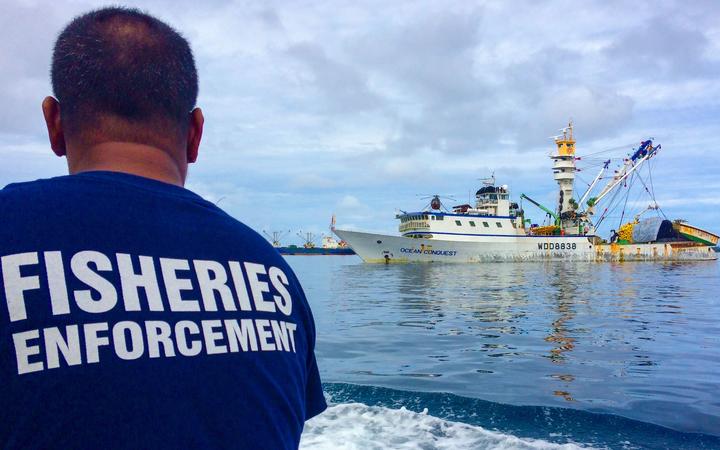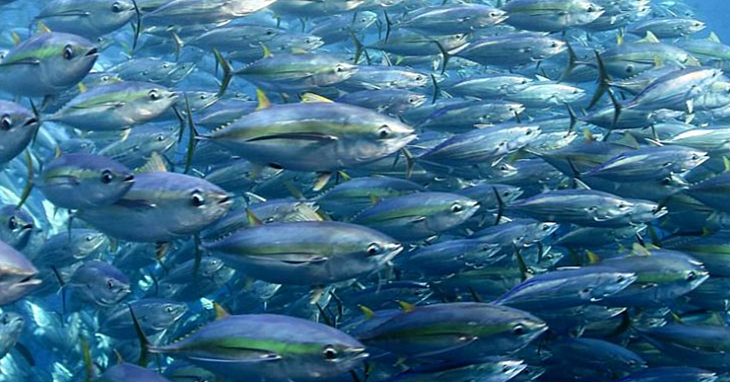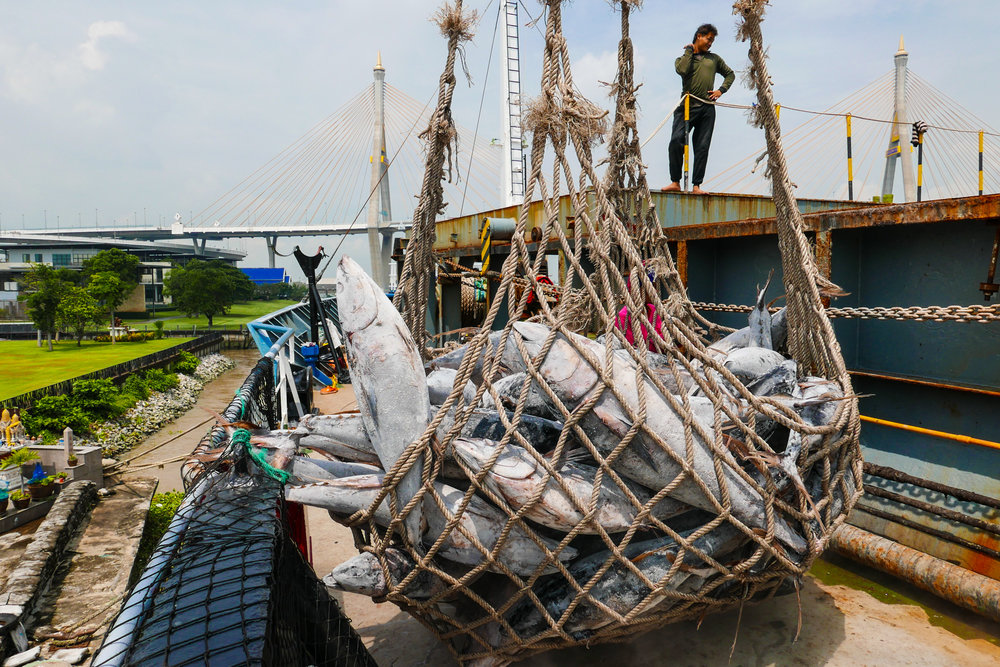Pacific fisheries, including the US fishing fleet, would be at greatest risk in terms of overlap with mining areas; Fisheries in Mexico, Spain, Ecuador, and the Philippines are also at risk
As companies and countries push to open international waters to ocean mining in as little as two years, a new study reveals that all contract areas licensed for deep-sea mineral exploration overlap with zones where tuna fishing fleets operate. The study is the first to estimate the potential negative impacts of ocean mining, from wastewater plumes to noise pollution, on the fishing industry.
“Our research shows that the fishing industry should be concerned about the prospect of ocean mining. Fishing fleets operating in the US Pacific should be especially alarmed,” said Jesse van der Grient, the lead author of the study, Potential spatial intersection between high-seas fisheries and deep-sea mining in international waters, and a researcher at the University of Hawaiʻi at Mānoa.
“Experts are only beginning to understand the potential impact ocean mining could have on hauls of tuna and other lucrative fish—critical to global nutrition, job creation and economic development. But it’s becoming increasingly clear that the fishing industry could take a significant hit if ocean mining goes ahead.”
The study mapped out massive areas earmarked for ocean mining to determine the extent to which they overlap with tuna fisheries. It found that fishing zones in the Pacific—especially a stretch of sea between Hawaii and Mexico spanning 4.5 million square kilometers (1.7 million square miles) known as the “Clarion Clipperton Zone”—face the greatest overlap with ocean mining and may therefore see the greatest negative impacts if deep-sea mining directly or indirectly affects tuna fisheries.
The seafloor in this area is littered with the polymetallic nodules—nuggets of minerals—sought by mining companies to supply batteries for electronic vehicles and other low-carbon technologies.
One estimate in the study found that 8.5-16% of fisheries overlap with mining areas in the US Pacific. Fisheries in Mexico, Japan, Spain, Ecuador, and the Philippines are also vulnerable to ocean mining. The study found that risks to the$40 billion tuna industry could be significant, with global ramifications, especially for small island- and low-income countries that depend on the fish trade for their prosperity.
“A growing body of research has already shown that ocean mining would inflict potentially irreversible damage on extremely sensitive ocean habitats and disrupt the ocean’s natural capacity to store and capture carbon,” said Douglas McCauley, an ocean expert at the University of California Santa Barbara. “This is the first study to reveal just how damaging ocean mining can be for fisheries. Until now, no one has talked about these impacts of deep-sea mining on fishing hauls.”
Two facets of ocean mining threaten fisheries. Waste ejected overboard by mining motherships could create large plumes, leading to toxic and suffocating pollution that will spread widely beyond the machine footprint. Some fish, like bigeye tuna and swordfish, can come directly in contact with the plumes as they either make deep dive (bigeye) or are present in deeper waters (swordfish), while others, like yellowfin tuna, will indirectly be affected if their prey come into contact with the plumes. As a result, harmful toxins work their way into ocean food chains and smother or choke out food for fish, which would reduce the number of fish. Additionally, noise, vibrations and light pollution from the mining equipment could also stress marine life.
Sometime in the near future, perhaps even in the next year, the International Seabed Authority (ISA) is expected to adopt regulations that would allow deep-sea mining to begin in the high seas–an area of international jurisdiction where all countries and people have a responsibility and claim over biodiversity and resource management.
In anticipation of this announcement, companies are wrangling to secure a foothold in the emerging industry, with some already testing their mining machines on the seabed. One million square kilometers—including an area the width of the continental U.S. or almost twice the size of France—has already been set aside for mining, which could begin by 2024 if approval from the ISA Council comes through this year. Some of the governments that already hold exploration licenses and are now lining up to mine the ocean floor include Brazil, Jamaica, Russia, U.K. and Japan.
In a recent statement, more than 600 academics from six continents called on countries and governments to press pause on these plans to open up the deep sea to mining. The cadre of leading ocean experts who issued the statement argues that far too little is known about these sensitive and important ocean ecosystems, which are already under stress from climate change, bottom trawling and pollution, as well as potential impacts of mining. They highlighted the risks to fisheries—among other industries, including tourism.
When issuing this statement, they joined a growing global chorus of more than 90 NGOs, environmental leaders such as Sir David Attenborough, Fiji Prime Minister Voreqe Bainimarama, and ocean scientists around the world that have all spoken out on the hazards of ocean mining.
Right now, the ISA includes observers from a diverse set of concerned marine industries – ranging from the subsea cable industry to the underwater munitions industry. However, the fishing industry is not represented. Furthermore, the Regional Fishery Management Organizations, the body charged with safeguarding the future of fisheries in many of these overlap zones, have not discussed ocean mining.
“I am surprised by the lack of engagement by the fishing industry in the ocean mining discussion. If the industry doesn’t act now, they risk fighting an uphill battle once the genie is out of the bottle and the regulations for ocean mining are set in stone. Some Pacific countries, such as Tonga, Fiji and Papua New Guinea, have expressed interest in a moratorium on ocean mining due to the potential impacts on their valuable ocean resources. Other countries with tuna fishing economies might want to follow suit.”
Information on the December ISA meeting
A long-delayed meeting of the International Seabed Authority (ISA) due to take place December 6-15 in Jamaica is expected to stage an effort by the global body’s secretariat to push through ocean mining regulations to meet a two-year deadline that many say is far too rushed.
Critics of ocean mining are concerned that too little is known about the climate, biodiversity, fishing and other impacts of extracting minerals from the ocean floor.
In June, the small island nation of Nauru–in collaboration with industry partners–issued an ultimatum to the ISA, requesting that regulations be completed within two years’ time, at which point they will apply for approval of their plans to begin mining.
Under this “two-year rule” the ISA must still consider Nauru’s mining plans for approval, even if regulations have not been finalised by the deadline. But the ISA is not obligated by this rule to adopt the regulation in two years. Nauru is a sponsoring state of Nauru Ocean Resources Inc (NORI), a subsidiary of controversial mining outfit The Metals Company, formerly known as DeepGreen.
Many groups directly involved in the ISA process have issued letters warning that two years is not a sufficient amount of time to complete the research needed to fully inform the development of regulations. These include letters issued by the Deep Ocean Stewardship Initiative, a group of Africa nations party to ISA, and members of the body’s Latin America and Caribbean group,
The Latin America letter warns that “no tangible progress has been achieved” on finalizing regulations and guidelines for mining.
Adding to the concern over the upcoming ISA meeting are the COVID-19 restrictions dictated by the host country, Jamaica, that will limit attendance by observer delegations to one person each, will not allow media to attend and will only enable a maximum of 50 people at events. ISA representatives from Brazil, Chile and Costa Rica–as well as the Deep Ocean Stewardship Initiative and the Deep Sea Conservation Coalition (both designated observers of the ISA) –have sent letters to the ISA secretariat requesting the meeting be postponed. So far, the ISA has declined a postponement of the meeting.
This push to speed up the process to approval of regulations is in contrast to growing calls from scientists, NGOs, civil society groups and businesses calling for a moratorium on deep-sea mining.
A global group of more than 500 leading ocean scientists have now signed a scientist statement calling for a moratorium, and members of IUCN World Conservation Congress voted against ocean mining. Added to this is strong opposition from business, including car manufacturers, computing giants and electronics manufacturers. For example, Microsoft recently endorsed a moratorium on ocean mining, and Philips is the latest of five major companies to sign a Business Statement Supporting a Moratorium on Deep Seabed Mining. BMW, Volvo, Samsung and Google are the other signers. NGOs and civil society are also sounding the alarm around ocean mining.
If allowed to go forward, deep-sea mining could result in a number of significant impacts to ocean health including threatening unique and important species, inflicting irreversible damage to sensitive ocean habitats, sourcing toxins into seafood via contaminated water plumes and disrupting key carbon stores on the ocean floor critical to combating climate change. A comprehensive scientific analysis should therefore be prioritized to ensure ocean mining does not result in a loss of biodiversity and degradation in ocean health.
This feature was produced by the University of Manoa on 18 November 2021, reposted via PACNEWS.



